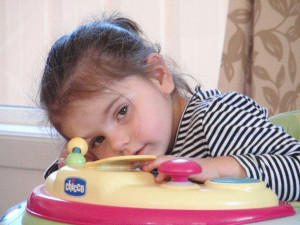About Rett Syndrome
Part proceeds from each book sale are donated to find a cure for Rett Syndrome.
Your purchases are much appreciated.
This is my youngest daughter, Abby, she has Rett Syndrome. She is a gorgeous young girl, happy (mostly J) and full of personality (including attitude when she wants to). Rett Syndrome has taken from her the ability to walk, talk and use her hands in any meaningful way.
—-
For random adventures from Abby’s world and info on Rett Syndrome – check out this part of the blog
—-
About Rett
For those not familiar with Rett Syndrome this is how it is described on the AussieRett website…
“Rett syndrome is a rare but serious neurological disorder that affects about 1 in 9,000 girls. Even more rarely, boys may be affected.
In 1999, it was discovered that Rett syndrome is commonly associated with a mutation in the MECP2 gene. The clinical diagnosis has often been uncertain in early childhood as the symptoms may be confused with those occurring in other disorders such as autism, cerebral palsy and non-specific global developmental delay. However, since the discovery of the association with abnormalities in the MECP2gene the clinical diagnosis is now often confirmed by genetic testing.
In most cases, early development is normal.
However, some time in the first 6 to 18 months of life, the normal pattern of childhood development does not progress.
In most cases there is a loss of communication and hand skills and the development of unusual hand movements, such as wringing, clapping and mouthing.
During this time the child may display autistic features and appear agitated and distressed.
In the long term, most children are no longer able to talk and many find it difficult or are unable to walk.
Other clinical features include poor growth, seizures, spinal curvature, altered breathing patterns, low bone density, gastrointestinal and sleeping problems.
Therefore, Rett syndrome is usually associated with severe disability and sometimes with considerable health problems. However, despite this many parents find that over time, their daughter may appear to improve in her social awareness and communication skills, and may learn more gross motor skills.”
—-
The search for a cure
There is some amazing research happening around the world, research that has the potential to change the lives of those with Rett Syndrome and those that care for them. In 2007 experiments on mice showed reversing the symptoms of Rett was possible. There are a number of research projects underway with the goal of using MECP2 Gene Therapy to significantly reverse the symptoms of Rett Syndrome. It’s exciting stuff, well worth a read.

